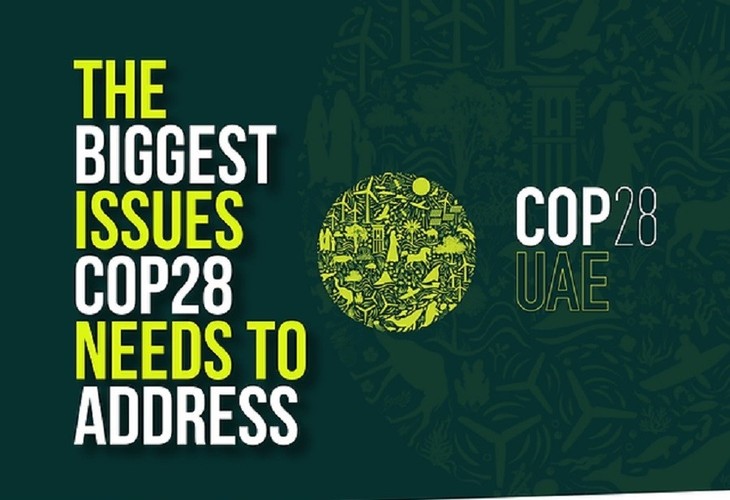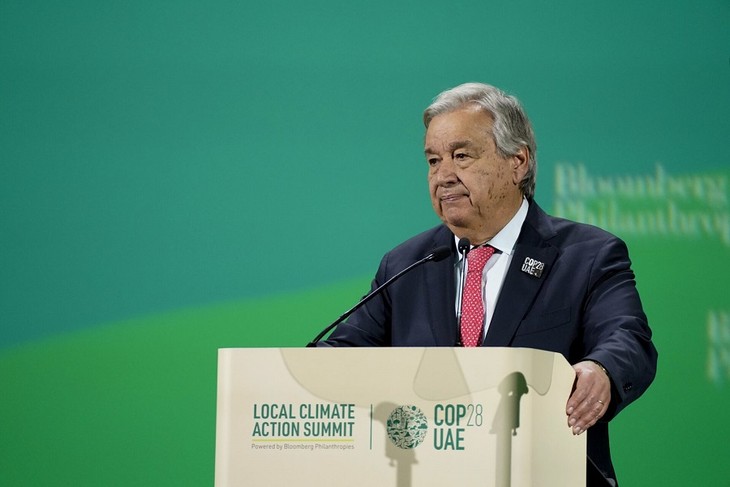(VOVWORLD) - The 28th Conference of Parties to the United Nations Framework Convention on Climate Change (COP28) is taking place from November 30 to December 12 in Dubai, the UAE. COP28 has achieved some significant results in the first few days of meeting, but the world is still demanding more drastic action and comprehensive cooperation toward climate goals.
 (Photo: cleanenergycapital.co.uk) (Photo: cleanenergycapital.co.uk) |
COP28 has established a "Loss and Damage Fund" to compensate the countries most vulnerable to climate change, adopted the Dubai Declaration on sustainable agricultural development, builded a new global food system involving 130 countries which is more resilient to climate change, and raised 800 million USD to deal with tropical diseases that global warming is stoking.
However, the key issues of cutting emissions, eliminating fossil fuels, and tripling renewable energy by 2030 have not seen any real progress.
 UN Secretary General Antonio Guterres address COP 28 in Dubai. (photo: AP) UN Secretary General Antonio Guterres address COP 28 in Dubai. (photo: AP) |
Fossil fuel
In his speech at the Climate Action Summit delivered to 140 heads of state and national leaders, UN Secretary General Antonio Guterres emphasized the elimination of fossil fuels. He cited recent UN reports which indicate the earth is now 1.4 degrees Celsius above the pre-industrial baseline and is on track to warm another 3 degrees Celsius by the end of this century. He called on countries to immediately establish a roadmap for eliminating fossil fuels, and said fossil energy companies cannot continue to avoid their responsibility.
"I have a message for fossil fuel company leaders: Your old road is rapidly aging. Do not double-down on an obsolete business model. Lead the transition to renewables. Make no mistake: the road to climate sustainability is also the only viable pathway to the economic sustainability of your companies," said Mr. Guterres.
The leaders of some countries most affected by climate change proposed a COP28 treaty on non-proliferation of fossil fuels, based on the model and binding mechanism of the nuclear Non-Proliferation Treaty.
Prime Minister of the Caribbean island nation of Antigua and Barbuda, Gaston Browne, said that the environmental crisis was a "glaring testament to a world where profits are prioritised over people and planets. "It is a world where oil and gas conglomerates, shielded by the power of wealthy nations, continue to reap astronomical profits, while the survival of nations like ours hangs in the balance," said Browne.
The call to eliminate fossil fuels, the focus of the first few days of COP28, stirred up a lot of controversy. The leaders of some countries and organizations, including the UAE, said there is not strong enough scientific evidence to justify eliminating fossil fuels and hastily eliminating fossil fuels will put a huge economic burden on developing countries.
Renewable energy
While the issue of eliminating fossil fuels sparked controversy and ended in deadlock, most countries supported accelerating energy transition.
More than 120 countries have signed on to the Global Commitment to triple renewable energy output and double energy efficiency by 2030. The UAE announced a 30-billion-USD fund to expand renewable energy in developing countries. The European Union said it will provide 2.5 billion USD in the next two years for energy transition in other countries, and UK Prime Minister Rishi Sunak pledged over 2 billion USD for the Green Energy Fund. However, President of the European Commission Ursula von der Leyen said these commitments to renewable energy and green energy are less than what is needed.
"In some countries, the cost of capital for renewables is prohibitively high. That is the message I took away from the African Climate Summit in Nairobi. We need to unlock the necessary financial support for countries that need it," said von der Leyen.
Many world leaders pointed out that donations promised by most countries and organizations have not yet been delivered. UK Prime Minister Rishi Sunak said that the mounting science and evidence of climate related disasters prove we are not moving fast enough, added that “everyone can do more".
Brazilian President Lula da Silva said that failing to honor commitments erodes the credibility of the entire multilateral system. He called on all parties to act immediately and cooperate more comprehensively. In particular, he said, countries with shared interests should undertake their own action programs, and not rely on the promises of developed countries.
With that in mind, the G77 group of developing countries organized a separate conference to discuss their own cooperative efforts. Representatives of countries in the world's three largest river basins (Amazon in South America, Congo in Africa, and Borneo-Mekong in Southeast Asia) promoted an agenda to protect tropical rainforests and biodiversity.